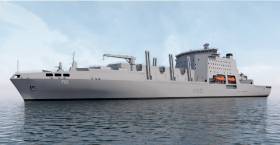Displaying items by tag: Shortlist FSS Ships
UK Shipyard On Merseyside Shortlisted With Syndicate for Fleet Solid Support (FSS) Contract
#Ports&Shipping- A UK shipyard based on Merseyside, Cammell Laird is delighted to have been shortlisted, as part of a syndicate of British firms, to compete to build three Fleet Solid Support (FSS) ships for the country's Ministry of Defence.
Defence Minister Stuart Andrew announced the shortlist which includes a British consortium made up of Cammell Laird, BAE Systems and Rolls-Royce and Babcock (see their Devon yard to close in early 2019). They join Italian firm Fincantieri, Spanish company Navantia, Japan Marine United Corporation, and Daewoo Shipbuilding and Marine Engineering of South Korea as the five successful firms who have been invited to submit a tender for the competition.
The FSS vessels will deliver ammunition, food and supplies to UK forces across the globe and will work alongside the Royal Navy’s fleet of warships and will be an important part of the UK Maritime Task Group.
The British consortium commented: “We are pleased to have been down-selected for the UK’s next class of Fleet Solid Support Vessels. The formation of a UK team, consolidates the strength, skills and experience from the UK naval enterprise to develop a highly capable and versatile vessel for the Royal Fleet Auxillary (RFA), while delivering economic benefit and value for the UK tax payer.”
In a UK Government press release, Defence Minister Stuart Andrew added "The widespread interest in this competition shows that our Royal Navy and Royal Fleet Auxiliary remain among the most prestigious in the world.
These support ships will be vital for supporting our formidable Queen Elizabeth Class carriers and will ensure our warships can deploy in a range of challenging environments and across huge distances, wherever they are in the world.
The five companies, which were selected from eight interested firms, will now develop bids before a final decision is made regarding the winning bidder in 2020.
The FSS ships, up to three of which will be procured through international competition as they are not warships, will be fitted with specialist and classified equipment at a British shipyard before entering service with the Royal Fleet Auxiliary from 2026.
Shipyards across the UK will be able to bid for this work in 2022.
As part of the RFA, the vessels will be civilian-manned and carry self-defence weapons only.






























































